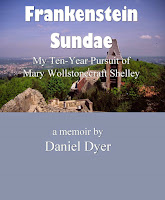Well, what
did Mary have to say about her father?
Mary began
by misspelling the town of her father’s birth, Wisbech (she wrote it as “Wisbeach”),
a small farming community at the time—a little over a hundred miles north of
London, in Cambridgeshire. She says very little about his family—then this, on
the first page: Very early, even in
childhood, he developed that love of acquirement and knowledge which stamped
his future career.[1] And so the praise and patent affection commence.
Only a few lines later she writes, Reason
and a love of investigation were the characteristics of Godwin, even in boyhood
….[2]
After
sketching his early career, she arrives at Caleb
Williams, which, she declares, is the
best [novel] in our language.[3]
She also praises Godwin for standing up to the government—and for standing up for his prosecuted friends—at a time of
great censorship and harsh handling of those publishing anything that implied
the government was going awry.
After some
more summary of his career, Mary arrives at the account of his father’s
marriage to Mary Wollstonecraft, whom Mary Shelley calls a woman with a lofty spirit. She adds: Even now, those who have survived her so
many years never speak of her but with uncontrollable enthusiasm. Her unwearied
exertions for the benefit of others, her rectitude, her independence, joined to
a warm affectionate heart, and the most refined softness of manners, made her
the idol of all who knew her.[4]
There were many, of course, who would never agree with this assessment; for
many conservatives, Mary Wollstonecraft represented the worst of liberal
sentiment.
But in these
words, we see the heart of Mary Shelley herself. She clearly adored the mother
she’d never known—had read her works repeatedly since she was able to read—and saw
her, throughout her own life, as the model for all.
Mary then
continues her journey through Godwin’s publications and life—pages rich with
praise for the father she loved. And her final passage could serve as a summary
for all: As a moral character, his
reputation is unblemished. He stands, in simplicity of wisdom, and consistency
of principle, the monument of the last generation, extending into this the
light of a long experience, and ornamenting our young and changeful literature with
the profounder and loftier views of a more contemplative era.[5] Again—many would
have disagreed.
Still, Mary’s
memoir of her father is a valentine—a long letter of admiration, of gratitude,
of love. In April 1831, when this memoir appeared with the re-issue of Caleb Williams, William Godwin had just
turned seventy-five years of age.


No comments:
Post a Comment